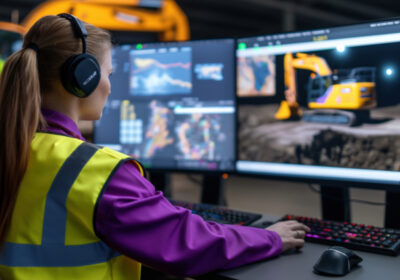The construction sector is set for growth by as much as 12% in 2024, according to Glenigan’s data. With this forecast, it’s important for companies within the industry to embrace new methods of streamlining processes to make them more efficient, and technology is a huge factor in this area.
However, an issue that arises is knowledge around this technology and how to maximise its usage. This creates challenges in recruitment, so many businesses could benefit from upskilling current employees to improve talent retention.
Data from Axonify survey outlines how difference-making upskilling is, with 50% of respondents would move to a new job if offered opportunities to expand their knowledge. Paul Taylor, Machined Seals Product Manager at FPE Seals, a leading supplier of hydraulic pistons for various sectors, including the construction sector, has offered expert insight into why upskilling is so important for adopting new technologies.
Drone piloting
Projects on construction sites can involve structures that are unsafe to investigate and analyse. This can be due to the height of the work or the foundations becoming degraded over time. Drones are an emerging technology that can be used to obtain high-quality images of the project for detection before potentially putting members of your workforce in danger.
This is a great opportunity for upskilling, as while operating some drones doesn’t require licencing as an operator, businesses can offer the option for employees to be trained and complete a Drone and Model Aircraft Registration and Education Service (DAMARES) or an A2 Certificate of Competency.
Connection with the Internet of Things
The Internet of Things (IoT) is revolutionising the construction sector by connecting machinery, tools, and equipment through the internet, enabling seamless communication and data exchange. To leverage IoT, construction companies must ensure their workforce is proficient in using IoT-enabled devices and platforms.
Training programmes should focus on educating staff about the benefits of IoT, such as predictive maintenance, enhanced safety, and improved project management. Workers need to be adept at using IoT sensors and devices to monitor real-time data on construction sites. This data can predict equipment failures, thus reducing downtime and maintenance costs. Additionally, IoT can enhance safety by monitoring site conditions and alerting workers to potential hazards.
By investing in IoT training, companies can improve operational efficiency and project outcomes. For instance, understanding IoT can help site managers make data-driven decisions, ultimately leading to more timely and cost-effective project completions.
Robotics, AI, and automation
Automating mundane and dangerous construction processes with robotics and artificial intelligence (AI) can save workforces significant amounts of time, allowing them to focus on higher-impact jobs within their roles. These technologies can significantly reduce labour-intensive tasks, enhance precision, and improve overall project efficiency. However, their successful implementation hinges on a well-trained workforce.
Robotics, such as bricklaying robots and autonomous machinery, require operators who are not only familiar with traditional construction methods but also adept at programming and operating these advanced systems. Training sessions should cover the basics of robotic operation, maintenance, and troubleshooting.
AI and automation, on the other hand, are used to optimise various aspects of construction projects, from planning and design to resource allocation and on-site execution. AI-driven software can analyse vast amounts of data to identify patterns and predict outcomes, helping project managers make informed decisions. Automation can streamline repetitive tasks, reducing human error and increasing productivity.
To upskill staff in AI and automation, construction firms should offer courses on data analytics, machine learning, and software utilisation. By equipping workers with these skills, companies can enhance their ability to deploy AI solutions effectively, leading to smarter project management and execution.
![]()
Building information modelling (BIM)
Building Information Modelling (BIM) is a game-changer in the construction industry, enabling detailed digital representations of buildings and infrastructure projects. BIM facilitates better collaboration, improved design accuracy, and efficient project management. To fully benefit from BIM, construction companies must ensure their workforce is proficient in this technology.
Training in BIM should cover the use of BIM software, an understanding of 3D modelling, and the ability to interpret and manipulate data within these models. Workers should be trained to collaborate using BIM, ensuring that architects, engineers, and construction managers can work together seamlessly.
By adopting BIM, construction firms can reduce errors, minimise rework, and optimise resource utilisation. Moreover, BIM enables better project visualisation, aiding client communication and satisfaction. Investing in BIM training not only enhances project outcomes but also positions companies as leaders in innovation.
Source
https://letstalktalent.co.uk/resources/the-ultimate-list-of-uk-hr-stats/
https://www.fpeseals.com/seals/piston-seals







